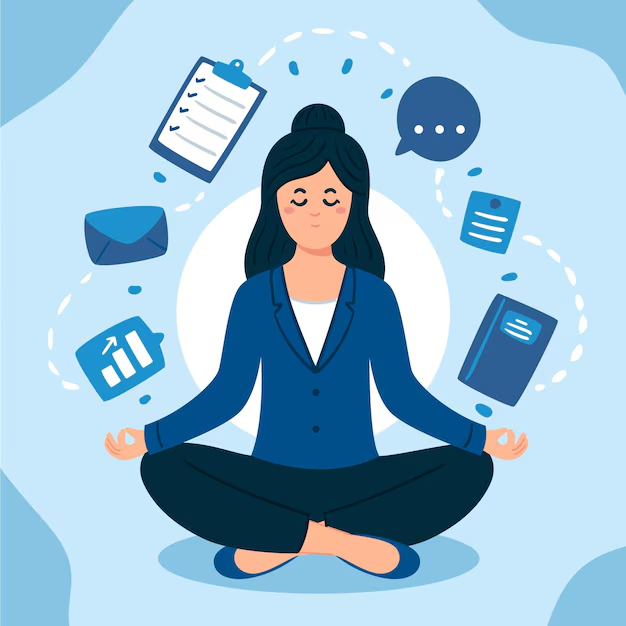
Introduction
In today’s fast-paced world, stress and low energy have become everyday struggles. Long working hours, digital distractions, poor sleep, and unhealthy diets create a cycle of fatigue and anxiety. When stress increases, your energy drops. When energy is low, stress feels heavier.
The good news? With the right lifestyle choices, nutrition, and natural support, you can manage stress effectively and boost your energy at the same time. This article will show you how stress and energy are connected and share natural strategies to help you stay calm, focused, and energized.
How Stress and Energy Are Connected
Stress is the body’s response to challenges. When you are stressed, your body produces cortisol, the stress hormone. While cortisol gives short-term energy in emergencies, long-term high cortisol levels drain the body, causing:
- Constant fatigue
- Poor concentration
- Irritability
- Weakened immunity
- Sleep problems
On the other hand, low energy increases stress. If you feel exhausted all day, small tasks feel overwhelming. That’s why it is important to break the cycle by managing stress and boosting energy together.
Signs You Need to Manage Stress and Boost Energy
- Feeling tired even after sleeping
- Constant cravings for sugar or caffeine
- Mood swings or anxiety
- Trouble focusing
- Frequent headaches or muscle tension
- Lack of motivation
Natural Ways to Manage Stress
1. Practice Mindfulness and Meditation
Spending even 10 minutes a day in meditation reduces cortisol and calms the mind. Mindfulness helps you focus on the present instead of worrying about the past or future.
2. Regular Exercise
Physical activity is a natural stress reliever. It releases endorphins, the “happy hormones,” while improving energy and stamina. Activities like yoga, walking, or dancing work best.
3. Deep Breathing Techniques
Breathing slowly and deeply reduces tension immediately. Try the 4-7-8 method: inhale for 4 seconds, hold for 7, exhale for 8.
4. Quality Sleep
Stress and poor sleep go hand in hand. Aim for 7–8 hours of restful sleep by keeping a routine, reducing screen time at night, and creating a calm environment.
5. Healthy Nutrition
Certain foods help the body cope with stress:
- Dark chocolate – improves mood
- Green leafy vegetables – rich in magnesium
- Herbal teas (chamomile, lavender) – relax the body
Natural Ways to Boost Energy
1. Eat Energy-Supporting Foods
Instead of sugary snacks or energy drinks, choose foods that give long-lasting energy:
- Whole grains – slow energy release
- Lean proteins – support muscle repair
- Nuts & seeds – provide healthy fats and nutrients
- Fresh fruits – natural sugars plus fiber
2. Stay Hydrated
Dehydration makes you feel sluggish. Drinking 2–3 liters of water daily keeps your energy steady.
3. Stay Physically Active
Even a 20-minute walk increases blood flow and oxygen supply, improving energy.
4. Power Naps
A short 15–20 minute nap during the day recharges the brain without affecting nighttime sleep.
5. Limit Caffeine & Sugar
They give a quick high but end in an energy crash. Replace with green tea or herbal drinks for smoother energy.
Lifestyle Habits That Support Both Stress Relief and Energy
- Create a Morning Routine – Start the day with light stretching, hydration, and deep breathing.
- Take Short Breaks – Working nonstop drains energy and builds stress. Use mini-breaks to recharge.
- Spend Time Outdoors – Fresh air and sunlight improve mood and increase vitamin D.
- Stay Organized – Planning your day reduces anxiety and conserves mental energy.
- Stay Connected – Talking to loved ones or friends provides emotional support.
Natural Supplements That May Help (Consult Your Doctor)
- Ashwagandha – Reduces cortisol and supports calm energy
- Ginseng – Increases alertness and stamina
- B-complex vitamins – Boost energy metabolism
- Magnesium – Relaxes muscles and nerves
- Omega-3 fatty acids – Support brain health and stress balance
Quick Stress-Relief and Energy-Boosting Practices
- Listen to uplifting music
- Do 5 minutes of stretching at your desk
- Drink lemon water or herbal tea instead of coffee
- Write in a gratitude journal
- Practice positive affirmations
Conclusion
Stress and low energy are deeply connected—but with the right habits, you can break the cycle. By practicing mindfulness, exercising, eating the right foods, staying hydrated, and following a healthy routine, you can manage stress naturally while boosting your energy levels.
Remember: sustainable change comes from consistency, balance, and self-care. With small daily steps, you can feel calmer, more energetic, and ready to live a healthier, happier life.

